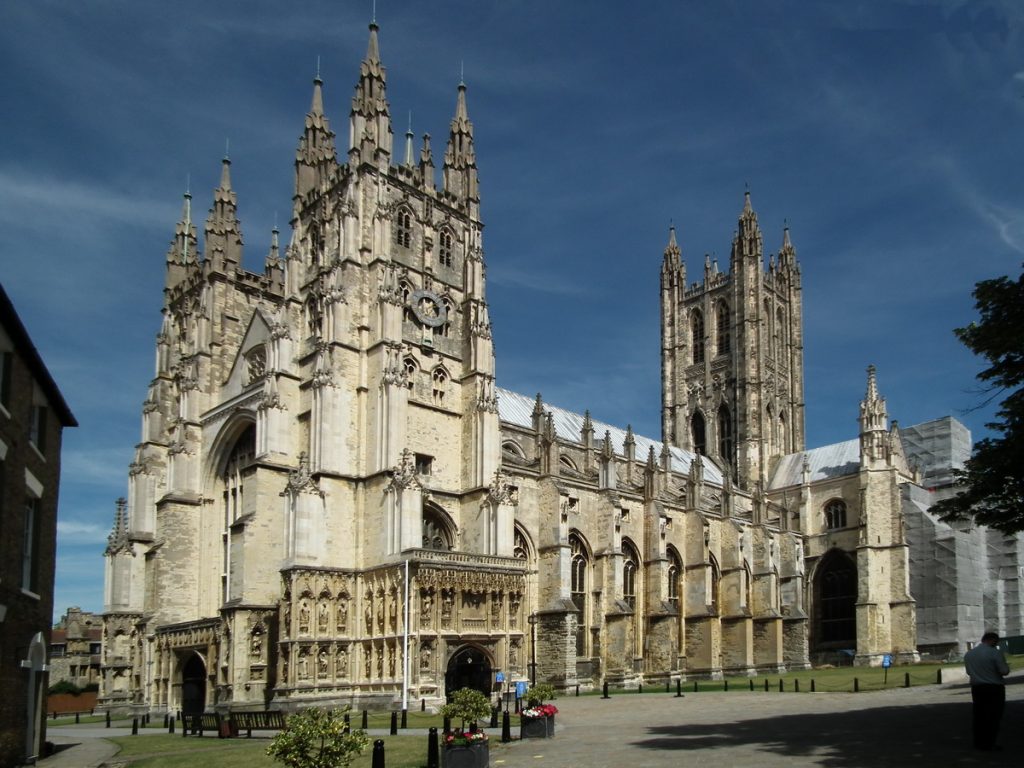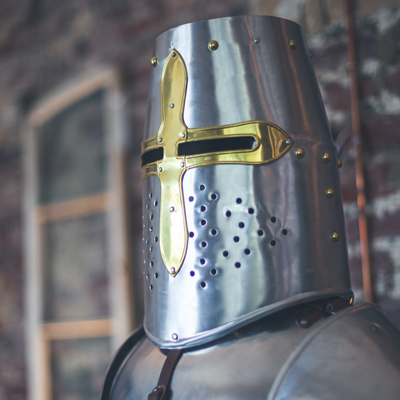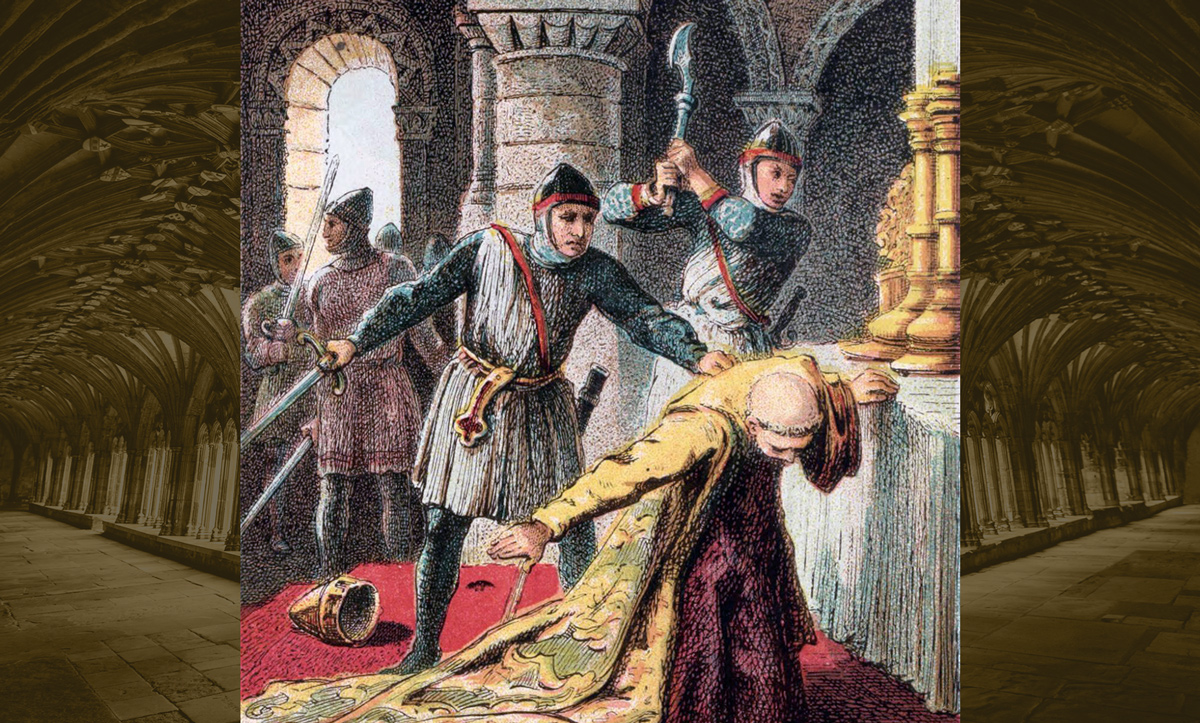By Vir Christi
St. Thomas Becket
Bishop & Martyr
Born December 21, 1118
Died December 29, 1170
Feast Day: December 29
The Gathering Storm
If people think the question of the relationship between church and state in modern times is new, England at the time of Thomas Becket would be quite the surprise for them. While the Catholic Church was still the foremost religious body in Western Europe—Protestantism would not come onto the scene for another three and a half centuries—monarchs of Europe were beginning to wrestle with the Church hierarchy. What rights belonged to the king, as father and head of his country, as opposed to the bishops and priests wielding that paternal authority in a spiritual sense? How much say did the king have in determining whether the law of the land or the Church was superior?
Thomas Becket and King Henry II of England were the closest of friends. Accounts of their friendship describe the two as being like-minded in many of the issues confronting England. Thomas is frequently credited as playing a major role in the political reforms Henry was applauded for instituting. Becket was an archdeacon in the Catholic Church when Henry named him chancellor, the highest administrative advisor to the king in England. Because of the growing tensions between Henry and the hierarchy of the Church, however, there would come a point when Thomas would have to choose between his loyalties.

Unintended Consequences
Henry himself was responsible for creating the circumstances which forced Thomas to make that choice. The archbishop of Canterbury—the highest cleric in England—died, leaving a vacancy; it was the prerogative of the king to nominate a candidate to Rome for a replacement. In light of the growing tensions between the Church and England, and seeing an opportunity to bring the Church firmly under his control, Henry nominated Becket. Thomas stridently opposed the nomination, arguing that it would force him at some point down the road to choose between the Church and the king, but Henry overruled his objections. Thomas was duly consecrated archbishop.
At the time of his consecration, Thomas underwent a tremendous conversion. He shunned the opulent lifestyle that he had been living, choosing instead the ascetic life. He confounded Henry by resigning the chancellorship, preventing the political maneuvering that Henry intended.
If that had been all Thomas did, it would not have been problematic for Henry. The two maintained an amicable relationship even after Thomas resigned the chancellorship. But problems arose when quarrels about jurisdiction disputes between the Church and England rose up. Thomas fervently defended the right of the Church to try priests and other Church ministers in ecclesiastical courts, independent of English political authority, prior to being handled by civil justice while Henry demanded that clerics guilty of civil crimes be tried in civil courts alone. The two struggled back and forth over the question of the authority of the state in Church affairs. Henry made life difficult for Thomas, and Thomas excommunicated several royal officials who had overstepped their bounds.
Hostilities between Henry and Thomas rose to such an extent that Henry fabricated charges of illegal money handling from Thomas’s time as chancellor and ordered him arrested. Thomas responded by fleeing England to take the case to the pope. Pope Alexander III ordered a reconciliation between the two, but by that point, the friendship between Henry and Thomas was damaged beyond repair. How many times do we come across situations in our life when we try to do God’s work as best as we can, and the result is the loss of close friendships or other goods we value dearly?
Thomas’ Martyrdom
Following the reconciliation between the two men, Thomas continued to frustrate Henry’s ambitions to exert influence over the Church. Henry had a number of clergy on his side, but because Thomas was the highest-ranking bishop in England, there was little the king could do to overrule Thomas. The pope had ordered that Thomas would remain as archbishop of Canterbury, and none of the other English bishops had the authority to overturn such a definitive verdict.
Some mistakenly believe that Henry ordered the assassination of Thomas, but in reality the king, in a state of high frustration with Thomas, cried out, “Will no one rid me of this turbulent priest?” It was meant as a rhetorical statement, but several of the king’s nobles took it literally and went to Canterbury Cathedral, where they killed Thomas on the altar steps.
Thomas demonstrated great personal courage during his martyrdom. Several of the priests in attendance at the cathedral heard the armed men coming and barred the doors to keep them out, but Thomas ordered them to open the doors. He chided his priests for treating the cathedral like a fortress of war, knowing that the men outside meant to do him harm but still permitting them entry anyway.
Henry was mortified when he heard the news of Thomas’s assassination. In the aftermath, he made a public show of penitence. When the pope proclaimed several years later that Thomas was to be canonized, Henry strongly supported this, as part of his demonstration of remorse for his careless remark. Thomas is a great example of bending to the will of God and remaining firm in the truth, even when it costs a person their friends and their life.
Where in your life is God calling you to be more courageous, to accept the consequences that may come from proclaiming the Gospel? Should your courage falter, remember Thomas’s brave words in parting: “For the Name of Jesus and in defense of the Church, I am willing to die.”

Vir Christi
Vir’s heart has been on fire for the Church from day one, and he dreams of the day when Constantinople will be a city again. He has a competitive drive satiated by sports and board games, but is also just as happy to sit down and read a good book for hours on end.






0 Comments